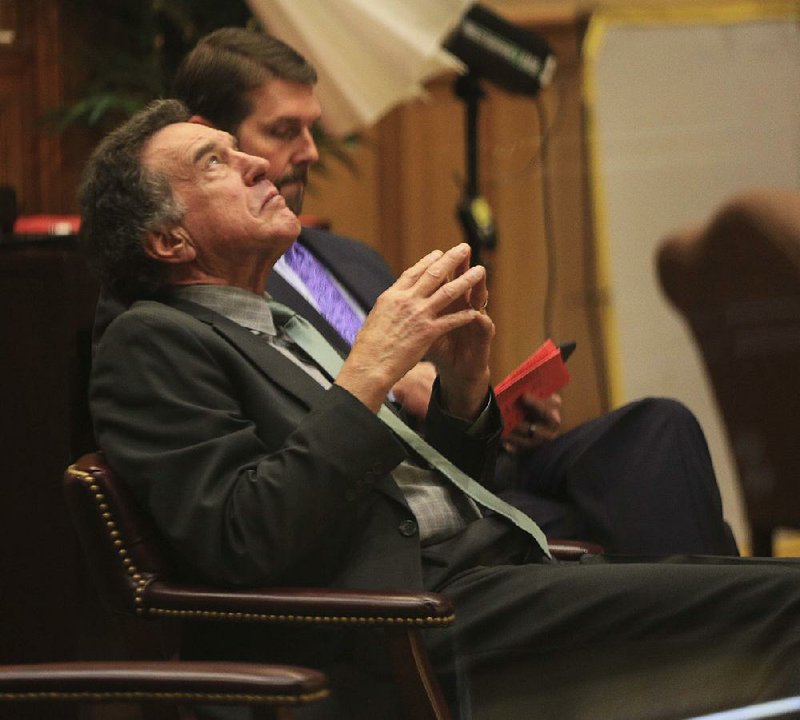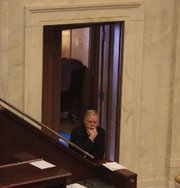Legislation aimed at filling potholes and other maintenance needs on Arkansas roads hit a big pothole of its own Tuesday in the state House of Representatives.
By a vote of 38-35, the House defeated the first of two bills that make up a package to raise more than $200 million annually for road maintenance and construction, but only if voters approve the proposal in 2018. The bill needed 51 votes in the 100-member House to send it to the Senate.
Seven House members voted present and another 20 didn't vote at all on House Bill 1726, which would refer to the 2018 general election ballot the authorization for the state Highway Commission to issue bonds for 20 years.
Voter approval of the bonds would lead to applying the 6.5 percent state sales tax on the wholesale price of gasoline and diesel. But after HB1726 failed, the sponsor of both bills, state Rep. Dan Douglas, R-Bentonville, didn't call for a vote on the tax measure, which is contained in HB1727.
Supporters of the legislation say it is needed to help maintain the state's 16,000-mile road system. Revenue from traditional fuel taxes have been flat or barely growing because of more fuel-efficient vehicles. Meanwhile, inflation has raised the cost of road construction.
As a result, they say, road maintenance needs have outstripped the Arkansas Highway and Transportation Department's ability to pay for them. The money also could be used to help match any new federal money that might flow to the state as a result of President Trump's promised infrastructure initiative, according to backers. Last year, the Legislature approved a different plan to use surplus dollars, treasury earnings and other available money to match federal highway funds.
The disappointment of the bond proposal's supporters was evident after Tuesday's vote.
"We don't have the money to maintain the highway system we've got," Douglas said. "We don't have the money in general revenue to transfer. There have been some people who've said we need to cut higher education funding by $250 million a year and give that to highways ... which I don't see happening.
"We'll just let the roads fall apart."
Tom Schueck of Little Rock, the vice chairman of the Highway Commission, said it was imperative that supporters try to find more votes.
"We're going to have to reconsider," he said. "We've got to have money. If we don't have money, we're going to have a lot of potholes. Even this bill had problems. It will be the middle of [2019] before we get some money.
"If you believe the president, we're going to get some money for infrastructure. I don't know where we're going to get the match for that if he gets us more money.
"There's a lot of problems, but this was as good as any way of getting it. This is not a tax. It's a user fee. It's not a tax on everybody in the state of Arkansas. It's a tax on the people that buy fuel, and that's the people that use roads. It was a big hurdle to overcome."
Douglas was unsure of what would happen next with his legislation, other than talking to his colleagues who voted against it or didn't cast a vote.
"I haven't taken a look at the vote tally yet other than the overall vote," he said. "I haven't talked to individuals. I will do that. I will take a look at it and see.
"Here's the thing. There's nobody that wants to pay more. But this was about letting the voters decide if they want their highways maintained better and to fund them because with the increased fuel efficiencies, lots of people are paying half or less taxes for road maintenance than they used to."
The setback came despite backing from Gov. Asa Hutchinson, who persuaded Douglas to amend the legislation to allow voters to consider it on the 2018 ballot.
Hutchinson told the Political Animals Club on Friday in Little Rock that, "With that change, it is hard for me to see how we should not say that a new highway plan should be the option of the voters in 2018."
Critics on the House floor disagreed and said other alternatives existed to raise money for road maintenance without increasing taxes.
Rep. Andy Mayberry, R-Hensley, said taxes are too high now.
"There are other ideas out there to approach this other than just raising taxes," he said. "We do have the highest income tax rate in the South. We have the highest gas and diesel fuel tax rate in this region. We have the second-highest combined state and local sales tax in the nation."
And the legislation would be in addition to other votes to impose more taxes, Mayberry said.
"In this General Assembly, we raised taxes for the first time, created a tax on unemployment, we raised the soda tax, created a new tax on digital downloads," he said. "I voted for those as well. It was a revenue offset to a targeted tax cut that I thought was good for the state of Arkansas. We also had another targeted tax cut -- a $50 million tax cut for those making $21,000 or less."
"This is absolutely a tax increase. It will raise the price of gas at the pump, and what it will do is cause the people of Arkansas to say, 'What are you guys doing down there?'"
But Rep. Charlie Collins, R-Fayetteville, urged passage of the legislation, which he said was imperfect but better than anything else lawmakers have discussed.
"The reality is, we are staring at a situation with a tax we have in place is worth less than one-half the dollars it was when it was enacted in the early '90s," he said, referring to the fuel excise taxes.
Through federally mandated fuel efficiency standards in vehicles and inflation, "we've had over a 50 percent tax reduction and now we're paying for it. It's a problem that's only going to get worse.
"I don't like raising taxes even though we're doing it in the right way. This eliminates the No. 1 tax exemption in the Arkansas Code. There is no bigger tax exemption in the Arkansas tax code with the exception of motor fuels from sales tax. That's the No 1. exemption.
"I don't know if this plan is good or not. I really don't. I just know it's the best anyone has come up with."
The vote wasn't split among party lines. The Democrats were just as divided as Republicans. Nine Democrats voted for the bill and while only one voted against the bill, four Democrats voted "present" and nine others didn't vote.
Rep. Mark McElroy, D-Tillar, was among those who spoke in favor of the bill.
"These roads aren't going to fix themselves," he said. "We're not asking you to raise taxes. We're not asking for a kidney. All we're asking is you to trust in the people to let them decide if they want to pay for the roads and fix them."
But House Minority Leader Michael Gray of Augusta said that while he supports better roads, especially in his district, he voted "present" because it was evident the chamber hadn't arrived at a consensus on the bill.
"If this is the best solution, I haven't got the assurances that it is," he said. "It looked like it was really heated and divided. The fear I have is, 'Will it be heated and divided among the public?' This is too important to leave to chance.
"I look forward to further discussions."
A Section on 03/15/2017



